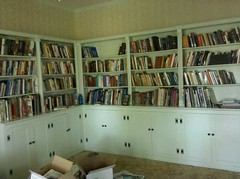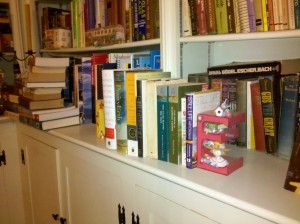Yesterday, I “joined” an online book club. The quotes are there because joining the club meant following it on Twitter and ordering the book for April. The club, called 1book140, is run by The Atlantic, and I discovered it through this article from The Wall Street Journal. Each month, the group votes for a book and then tweets along as the members read it. This month, the group is reading The ecco Anthology of International Poetry.
Laura Moser, the author of the WSJ article describes why she chose this particular group:
There are only a few active book clubs on Twitter: Penguin hosts one, as does the Jewish Book Council. The clubs have different guidelines and formats, but most put forth a title for discussion that takes place on Twitter at a specific time. Because I couldn’t commit to being in front of my computer at any given time, I went with the Atlantic magazine’s 1book140, which is nearly two years old and now has more than 84,000 followers (although only a handful actively participate). I also liked the democratic chaos of the largely unmoderated discussions.
I, too, love the concept of “democratic chaos.” And being able to follow the flow in Tweetdeck will make the club a natural part of my day. I’ll be learning and sharing with others around the world.
So, does this count as a MOOC? I suppose it isn’t a “course” as it isn’t run by a university. But, like a course, it has a beginning and ending. Two facilitators, one of whom has ties to MIT, lead the group. There are expectations for participation like those outlined in a course syllabus. I’m reading and discussing a book, albeit in 140 character bursts…sounds like every English course I took in college. Like most MOOCs, I won’t get any academic credit, and I won’t pay any tuition fees. And, I will be learning with a group, which seems to be the fundamental definition of a MOOC.
Why does it matter? Because it points to the difficulty and implications of defining web-based learning experiences. When we call some of these experiences MOOCs, we elevate them to a higher status. For teachers, it might mean the difference between receiving continuing education units or not. It is hard for administrators to imagine that real professional learning can occur in as part of democratic chaos; yet, for many of us, that is exactly where our learning happens these days.


